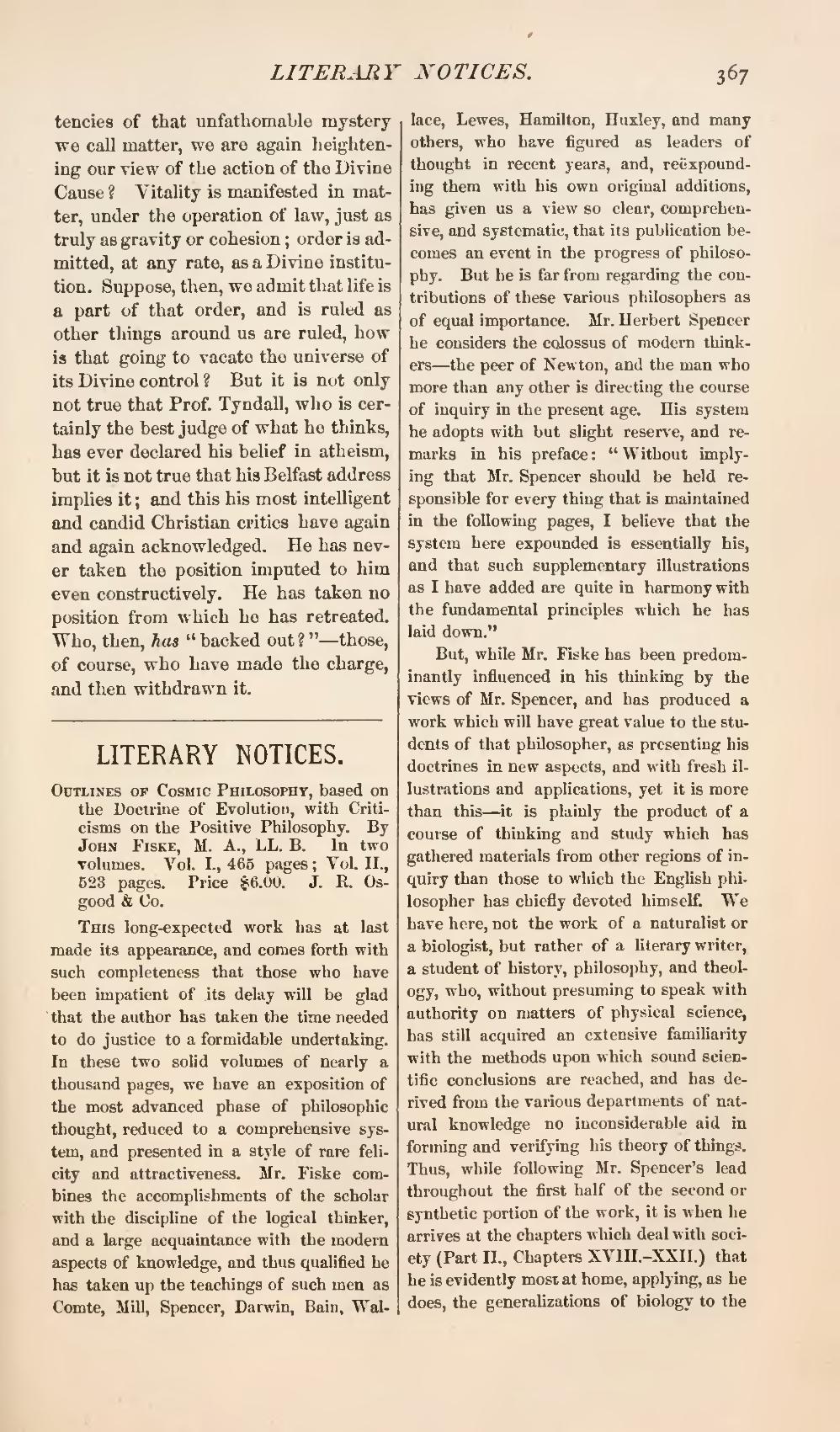tencies of that unfathomable mystery we call matter, we are again heightening our view of the action of the Divine Cause? Vitality is manifested in matter, under the operation of law, just as truly as gravity or cohesion; order is admitted, at any rate, as a Divine institution. Suppose, then, we admit that life is a part of that order, and is ruled as other things around us are ruled, how is that going to vacate the universe of its Divine control? But it is not only not true that Prof. Tyndall, who is certainly the best judge of what he thinks, has ever declared his belief in atheism, but it is not true that his Belfast address implies it; and this his most intelligent and candid Christian critics have again and again acknowledged. He has never taken the position imputed to him even constructively. He has taken no position from which he has retreated. Who, then, has "backed out?"—those, of course, who have made the charge, and then withdrawn it.
Outlines of Cosmic Philosophy, based on the Doctrine of Evolution, with Criticisms on the Positive Philosophy. By John Fiske, M. A., LL. B. In two volumes. Vol. I., 465 pages; Vol. II., 523 pages. Price $6.00. J. R. Osgood & Co.
This long-expected work has at last made its appearance, and comes forth with such completeness that those who have been impatient of .its delay will be glad that the author has taken the time needed to do justice to a formidable undertaking. In these two solid volumes of nearly a thousand pages, we have an exposition of the most advanced phase of philosophic thought, reduced to a comprehensive system, and presented in a style of rare felicity and attractiveness. Mr. Fiske combines the accomplishments of the scholar with the discipline of the logical thinker, and a large acquaintance with the modern aspects of knowledge, and thus qualified he has taken up the teachings of such men as Comte, Mill, Spencer, Darwin, Bain, Wallace, Lewes, Hamilton, Huxley, and many others, who have figured as leaders of thought in recent years, and, reëxpounding them with his own original additions, has given us a view so clear, comprehensive, and systematic, that its publication becomes an event in the progress of philosophy. But he is far from regarding the contributions of these various philosophers as of equal importance. Mr. Herbert Spencer he considers the colossus of modern thinkers—the peer of Newton, and the man who more than any other is directing the course of inquiry in the present age. His system he adopts with but slight reserve, and remarks in his preface: "Without implying that Mr. Spencer should be held responsible for every thing that is maintained in the following pages, I believe that the system here expounded is essentially his, and that such supplementary illustrations as I have added are quite in harmony with the fundamental principles which he has laid down."
But, while Mr. Fiske has been predominantly influenced in his thinking by the views of Mr. Spencer, and has produced a work which will have great value to the students of that philosopher, as presenting his doctrines in new aspects, and with fresh illustrations and applications, yet it is more than this—it is plainly the product of a course of thinking and study which has gathered materials from other regions of inquiry than those to which the English philosopher has chiefly devoted himself. We have here, not the work of a naturalist or a biologist, but rather of a literary writer, a student of history, philosophy, and theology, who, without presuming to speak with authority on matters of physical science, has still acquired an extensive familiarity with the methods upon which sound scientific conclusions are reached, and has derived from the various departments of natural knowledge no inconsiderable aid in forming and verifying his theory of things. Thus, while following Mr. Spencer's lead throughout the first half of the second or synthetic portion of the work, it is when he arrives at the chapters which deal with society (Part II., Chapters XVIII.-XXII.) that he is evidently most at home, applying, as he does, the generalizations of biology to the

